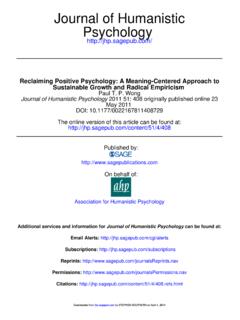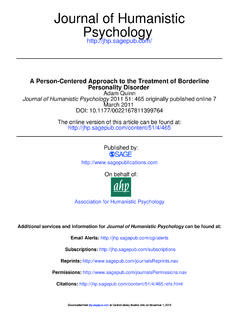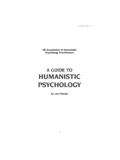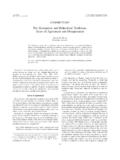Transcription of Journal of Humanistic Psychology - David H. Jacobs
1 PsychologyJournal of Humanistic online version of this article can be found at: DOI: 2009 2010 50: 312 originally published online 31 Journal of Humanistic PsychologyDavid H. Jacobs and David Cohenon Pathology Versus AgencyDoes ''Psychological Dysfunction'' Mean Anything? A Critical Essay Published by: behalf of: Association for Humanistic Psychology can be found at: Journal of Humanistic PsychologyAdditional services and information for Alerts: : : : : by Books Editorial on August 3, from Journal of Humanistic Psychology50(3) 312 334 The Author(s) 2010 Reprints and permission: http://www. : Psychological Dysfunction Mean Anything? A Critical Essay on Pathology Versus AgencyDavid H. Jacobs1 and David Cohen2 AbstractAny effort to discuss or study psychopathology (by any name) must decide how to distinguish between psychopathology and narratively comprehensible reactions to adverse circumstances of life.
2 A pathology framework, which views the distressed individual as acted on by impersonal forces, is incompatible with an agential framework, which views the individual as the protagonist in a unique story. Although the Diagnostic and Statistical Manual of Mental Disorders (DSM) recognizes this issue, it addresses it by postulating that primary mental disorder results from a psychological dysfunction and non culturally sanctioned reactions to life events indicate mental disorder. In this essay, the authors examine whether the concept of psychological dysfunction can withstand an analogy to that of biological dysfunction. They also examine the DSM s view that culture has already prepared an official evaluation of any reaction to the vicissitudes of life. They conclude that the DSM has failed to convincingly distinguish between psychopathology and reactions to life s vicissitudes. They suggest that the DSM s insistence on separating people s feelings and actions from their own unique circumstances 1 Pyrysys Psychology Group, La Jolla, CA, USA2 Florida International University, Miami, FL, USAC orresponding Author: David H.
3 Jacobs , Pyrysys Psychology Group, 8950 Villa La Jolla Drive, Suite B214, La Jolla, CA 92037, USAE mail: by Books Editorial on August 3, from Jacobs and Cohen 313and context amounts to a moral, not scientific enterprise. The study of how people fare in living should abandon the concept of mental disorder and related dysfunction, biological dysfunction, mental disorder, psycho pathology, human agencyThe tendency has always been strong to believe that whatever received a name must be an entity or a being, having an independent existence of its own. And if no real entity answering to the name could be found, men did not for that reason suppose that none existed, but imagined it was something peculiarly abstruse and mysterious. John Stuart Mill, 1843If a person s thoughts, feelings, or behavior deviate from what is socially or culturally valued or expected, then the question What is wrong? usually arises. The American Psychiatric Association s Diagnostic and Statistical Manual of Mental Disorders, 4th edition, text revision (DSM-IV-TR; American Psychiatric Association [APA], 2000) states that when the deviations amount to clinically significant distress or disability, what is wrong is a mental disorder resulting from behavioral, psychological, or biological dysfunc-tion (p.)
4 Xxxi). Among mental disorders, DSM-IV-TR further distinguishes primary mental disorders : those that are not due to a general medical con-dition and that are not substance induced (p. 181). The reason for calling clinically significant distress or psychosocial disability a mental disorder, and attributing it to a dysfunction, is to remove the distress and disability from the everyday agential or person-in-situation framework of understanding and dis-course and to place it within the pathology framework ( , the person, through no action or intention of his or her own, has become the setting for the opera-tion of impersonal, harmful, cause effect processes).In its introductory section titled Definition of a Mental Disorder, how-ever, the DSM-IV-TR acknowledges explicitly that it is unclear when the pathology framework is called for, as sufficiently severe adverse circumstances can induce distress or disability in anyone.
5 This amounts to recognition that unless primary mental disorders can be convincingly distinguished from justi-fiable reactions to the vicissitudes of life, it would be pointless to expound on varieties of primary mental disorders. The DSM-IV-TR suggests two criteria to by Books Editorial on August 3, from 314 Journal of Humanistic Psychology 50(3)make the distinction. First, it proposes that some reactions to adversity are sanctioned by culture whereas others are not; sanctioned reactions are excused from being considered a primary mental disorder whereas nonsanc-tioned reactions may be so considered. Second, it states that primary mental disorders are produced by psychological dysfunction. This term is not defined or discussed in the manual, and no suggestions are offered on how to detect psychological dysfunction independently of its symptoms. Based on its position in the quote cited in the first paragraph of this essay, however, the expression is presumably to be understood as isomorphic with biologi-cal dysfunction.
6 In other words, if the meaning of biological dysfunction is understood and one must assume that the authors of DSM-IV-TR take this for granted then psychological dysfunction means the same thing as biological dysfunction except that when it comes to the former, the mind and not the body is dysfunctioning. Yet, despite this causal attribution to psychological dysfunc-tion in the DSM-IV-TR, psychiatric research in general clearly does not seek to discover psychological dysfunctions that produce primary mental disorders. Rather, the quest is for biological dysfunctions (or anything biological) that could help identify any primary mental disorder (we discuss the example of depression in this essay). This is because American psychiatry, at least since the arrival of DSM-III in 1980, regards primary mental disorders as somatic diseases awaiting medical discovery of etiopathogenesis ( , Wilson, 1993).The DSM acknowledges that the presence of a medical disease, diagnosed on the basis of objective physical evidence, does not in and of itself neces-sarily account for offensive or disappointing or otherwise untoward social behavior ( , see the DSM-IV-TR discussion of Mood Disorder Due to a General Medical Condition, pp.)
7 401-403). In other words, judging social behavior cannot be reduced to identifying the presence of somatic disease. This could be the basis for arguing that identifying somatic disease is one thing while evaluating social behavior is another (Szasz, 1960), but for the purpose of this article, we confine ourselves to examining whether psycho-logical dysfunction bears anything more than an acoustic resemblance to biological the DSM-IV-TR s introduction recognizes that personal distress or psychosocial disability may be understood in terms of story, the rest of the manual disregards story altogether when it comes to distinguishing mental disorder present from not present. This accords with conceptualizing each primary mental disorder as an autonomous medical disease whose identifi-cation in no way depends on investigating the patient s personal history. The DSM-IV-TR even grants users of the manual permission to ignore Axis IV (Environmental and Psychosocial Problems; p.
8 37) if they wish. by Books Editorial on August 3, from Jacobs and Cohen 315We argue in this essay that the DSM-IV-TR fails to solve the problem of distinguishing psychopathology from narratively comprehensible reactions to adversity. The DSM-IV-TR is unable to convincingly distinguish any form of personal distress or psychosocial disability that cannot be attributed eviden-tially to biological pathology, from story. Our discussion mostly focuses on whether psychological dysfunction actually means anything like biologi-cal dysfunction, and we conclude that it is merely a slogan whose appeal lies in extending a familiar medical idea to the psychological We also critically examine, and then reject as nonsensical, the notion that the cul-ture has already decided on sanctioned and nonsanctioned reactions to anything that might happen in a person s life. Therefore, we conclude, expla-nations of distress and disability should remain in the ordinary alternative framework of agential doings, or understanding through personal history, or story.
9 Unless primary mental disorder can be given a nonarbitrary, non-tautological meaning, the term should be considered as an expression of disapproval (a form of You re out of your mind! ), a kind of trope. The content of a trope cannot be scientifically investigated and explained nor can one argue about the facticity of a trope ( , is this person really suffering from a primary mental disorder or not?)Biological Dysfunction as the Model for Psychological DysfunctionIn a 1982 book, Psycho Politics, Peter Sedgwick presented a heuristic way to comprehend what pathology and dysfunction might mean when applied to the concerns of medicine and to those of psychiatry and Psychology . Sedgwick argued that no intrinsic biological pathology or dysfunction exists in nature. Rather, all that exists is what usually occurs and deviations from what usually occur. People s interests and values indicate what states are desirable and undesirable (normal and pathological) in regard to their own physical health or the status of another organism or species.
10 One cannot conclude that proper function or dysfunction is immanent in nature itself, because nature has no plan or purpose for any organism or Natural selection has not liter-ally designed anything, thus an organism cannot fail to develop or function as it is supposed to ( , simply on the basis of the most common fate for species, the conclusion would be that nature s favorite plan is extinction; Gould, 1989, 2000; Rose, 2000; Ruse, 2000). The APA in effect conceded this point in the 1970s when it decided that maintaining homosexuality as a mental disorder was indefensible (Bayer, 1987).Although biological pathology or dysfunction is not immanent in the obs-ervable facts themselves, people easily agree on what constitutes desirable by Books Editorial on August 3, from 316 Journal of Humanistic Psychology 50(3)and undesirable, or good and bad, bodily health. Therefore, because agree-ment based on values seems indispensable to identify pathology in medicine, Sedgwick (1982) concluded that nothing in principle blocks the application of values to identify pathology in psychiatry.









